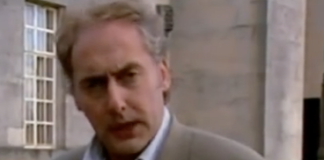- Opposites attract - 26th February 2026
- Upset coffee - 25th February 2026
- Not acting the part - 24th February 2026
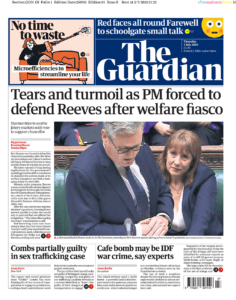 The breakdown of under-pressure Chancellor Rachel Reeves in the House of Commons (HoC), as well as the passing of her controversial welfare ‘reform’ bill despite protests (including from Welsh groups), and media scrutiny by outlets like The Eye, highlights the critical role of Wales in the continuing drama.
The breakdown of under-pressure Chancellor Rachel Reeves in the House of Commons (HoC), as well as the passing of her controversial welfare ‘reform’ bill despite protests (including from Welsh groups), and media scrutiny by outlets like The Eye, highlights the critical role of Wales in the continuing drama.
Soon after the contentious parliamentary vote (which has been dubbed a ‘fiasco’ by the press), the Cardiff and Valleys branch of DPAC (Disabled People Against Cuts), issued a strongly-worded statement condemning what had happened.
They said: “Tuesday’s circus in the House of Commons, followed by a vote on an unclear and rushed through welfare bill, may have placated some Labour rebels, but disability activists say the bill must be stopped.
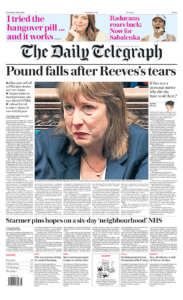 “After a lengthy debate, including U-turns from Prime Minister Keir Starmer, with verbal promises that the changes to PIP (Personal Independence Payment) will not go through before a review by Minister of State for Social Security and Disability, Stephen Timms in the autumn, the controversial Universal Credit and Personal Independence Payment bill got voted through on Tuesday. MPs voted by 335 votes to 260 to give the bill their initial approval. The vote saw the government’s working majority cut from 165 to 75, as some Labour rebels held true to their word.
“After a lengthy debate, including U-turns from Prime Minister Keir Starmer, with verbal promises that the changes to PIP (Personal Independence Payment) will not go through before a review by Minister of State for Social Security and Disability, Stephen Timms in the autumn, the controversial Universal Credit and Personal Independence Payment bill got voted through on Tuesday. MPs voted by 335 votes to 260 to give the bill their initial approval. The vote saw the government’s working majority cut from 165 to 75, as some Labour rebels held true to their word.
“Wales has a higher number of people living poverty than other nations, and has consistently high rates of child poverty. Despite this, shamefully, only one Welsh MP, Steve Witherden from Montgomeryshire and Glyndŵr constituency, voted against these cuts.”
Ms Reeves (even it seems the Prime Minister [PM] himself) is under severe pressure, with sources close to her insisting that her breaking down in tears had nothing to do with the unfolding political drama. Even so, financial markets became jittery after her emotional display – borrowing costs surged and the pound fell by one per cent.

In the wake of it The Economist reported about her boss, Sir Keir Starmer: ‘After a brutal week, in which a backbench rebellion forced him to abandon welfare cuts and his chancellor, Rachel Reeves, was reduced to tears in Parliament, Sir Keir wants people to look beyond the drama and judge him by what he’s achieved. We have. The verdict, so far, is that he is making dreadfully slow progress, which helps explain why Labour’s support has fallen from 34% last July to 24%, five points behind Reform UK. The Economist’s “Starmer tracker”, described in this section, finds much the same’.
Sky has published: “Two senior Labour MPs have suggested the prime minister may have to go within months if the government continues to perform poorly”.

The timing of Ms Reeves’ tearful outburst is intriguing, and Sky has also reported: ‘There were uncomfortable scenes in Prime Minister’s Questions yesterday.
‘Chancellor Rachel Reeves was in tears throughout and, although her team said this was the result of “personal issues”, there’s been much speculation about why’.
Here is our story about the extraordinary events from Wednesday.
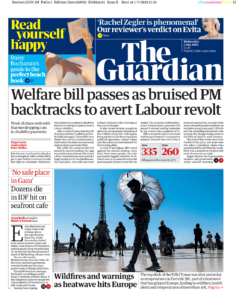 The passing of a welfare cuts bill last night by 75 votes after last minute changes were made to stave off a major rebellion, underlines previous controversies about the ‘reforms’ in which Wales was central.
The passing of a welfare cuts bill last night by 75 votes after last minute changes were made to stave off a major rebellion, underlines previous controversies about the ‘reforms’ in which Wales was central.
The BBC reported: “The government has won a vote on its benefits bill by 75 votes, but only after offering last-minute concessions to Labour rebels.
“Ministers had already watered down their plans once by reversing some cuts to universal credit and protecting current claimants of personal independence payment (Pip) from stricter eligibility rules.”

But in a formal submission before them disabled people in Wales (with the plans being partially-reversed), stated they were “half-baked” as well as “harmful”, yet a big ‘thank you’ was also offered to journalists (including our Editor, Welshman Phil Parry and reporters on The Eye) when a solitary ‘consultation’ meeting was re-instated after being cancelled.
The long response from Disabled People Against Cuts (DPAC) Cymru says: “Thank you to the journalists that have helped us hold politicians to account and give disabled people and carers a voice, in particular Kit (Swansea Bay News), Shaurya (Wales Online), Crispin (Crispin Flintoff show), the two Caits (LBC), Emily Price and Martin Shipton (Nation.Cymru), John Pring (Disability News Service), Phil Parry (the Eye magazine), Steve Topple (Canary), Hamish (ITV), Paul (BBC), Seb (voice.cymru), Louise (Bylines) and Dr Rachel Morris (Bylines Cymru, now Cymru Conversations)”.

The single ‘consultation’ meeting in Wales, though, was condemned by DPAC which heavily criticised the arrangements for disabled people.
The submission contains details of what happened to one wheelchair-bound protester, saying: “Joshua Reeves BEM was denied entry, and left outside in 30-degree heat.
- Reeves is one of the UK’s most outspoken disabled advocates, with over a decade of national and international experience, including representing disabled communities in Antigua in 2017 with the Commonwealth Youth Council.
- He described his treatment as ‘humiliating.’”

It also declares about the now-revamped scheme: “These are half-baked, insulting, harmful, cynical, Thatcherite plans, with blatantly dishonest methodology and serious failings at every step across the entire democratic process.
“The government’s proposals will be devastating for Wales…
“190,000 people will lose out – 6.1% of the population – taking £466 million/year out of our pockets. This will cost the jobs of personal assistants and carers. It will leave stretched councils and the Welsh NHS to pick up the slack”.

However despite what has been described in the media as a “climbdown” there remain problems for the UK Government.
Sir Keir Starmer battled to stop a revolt over the cuts, with about 50 Labour MPs concerned the fresh concessions will create a ‘two-tier’ system where existing and new claimants are treated differently.
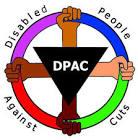
 Senior UK Government sources have insisted things are now “moving in the right direction” for No 10, with the whips phoning backbenchers to persuade them to support the bill, and there is talk of huge tax rises to plug a black hole in public finances.
Senior UK Government sources have insisted things are now “moving in the right direction” for No 10, with the whips phoning backbenchers to persuade them to support the bill, and there is talk of huge tax rises to plug a black hole in public finances.
All of this has put centre stage what has taken place in Wales.
The restored solitary ‘consultation’ meeting in Wales (in Cardiff) did not live up to expectations for demonstrators, with Mr Reeves saying: “It felt humiliating. Like being silenced in plain sight”.
The original welfare cuts plan sparked fury from all corners – with campaigners, charities and dozens of Labour MPs urging UK ministers to abandon the changes, branding them “impossible to support”.

Shocked by how large the protests had become, Sir Keir’s government altered them, with The Guardian reporting when earlier changes were made public: “More than 120 MPs are poised to rebel against the government… and there remains division at the top of government over how to stem the growing anger.
“Concessions under consideration include changes to the points needed for eligibility for personal independence payments (Pip), a benefit paid to those both in and out of work.

“MPs also want to see changes made to other reforms affecting the health top-up for universal credit which applies to those who cannot work.
“The prime minister’s chief of staff, Morgan McSweeney, has been having one-on-one talks with senior rebels. A number of cabinet ministers are now said to believe the bill has no chance of passing in its current form, though some are still being deployed to speak to angry MPs in an attempt to win them over.”
The BBC said: “The government has confirmed it will make changes to its welfare bill following pressure from Labour rebels on its planned changes to benefits.
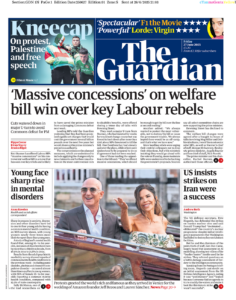 “In a letter to MPs, Work and Pensions Secretary Liz Kendall said claimants of the Personal Independence Payment (Pip) will continue to receive what they currently get, as will recipients of the health element of Universal Credit.Instead, planned cuts will only hit future claimants.
“In a letter to MPs, Work and Pensions Secretary Liz Kendall said claimants of the Personal Independence Payment (Pip) will continue to receive what they currently get, as will recipients of the health element of Universal Credit.Instead, planned cuts will only hit future claimants.
“The concessions amount to a massive climbdown from the government, which was facing the prospect of defeat if it failed to accommodate the demands of over 100 backbenchers.”
But DPAC announced: “There are no last-minute concessions that can patch over the problems with this flawed and rushed bill. What the government must do now is withdraw it, and allow time to read the responses to the public consultation, which doesn’t even end until the 30th. It is unconscionable to hold a vote before considering those responses, let alone while the ink is still dry”.

Apart from Mr Reeves calling the single ‘consultation’ meeting in Wales “humiliating”, it was also described by him as a “rubber stamp” exercise.
He was refused access to the meeting, proclaiming that he had been “…left outside in 30-degree heat while the event began without me. Despite four DWP note takers being present, no one came out to include me or others facing access barriers. That wasn’t a mistake — it was a message. And let’s be honest: they knew exactly who I was”.
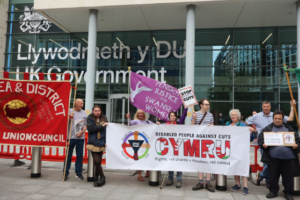
“It felt…like being silenced in plain sight. I showed up with lived experience, policy insight, and a platform — and was still treated as an inconvenience.
“This event wasn’t about listening to disabled people. It was about rubber-stamping pre-written plans to dismantle our support systems. Under the guise of ‘engagement’, the DWP is pushing through brutal cuts to lifelines like PIP and Access to Work — systems that are already crumbling. This is not reform. It’s removal — of autonomy, dignity, and survival.”


in a media statement giving the news about the ‘consultation’ restoration from the Department for Work and Pensions (DWP), DPACannounced: “We are glad that the disability cuts consultation event for Wales has now been rearranged in a central location with sufficient notice. But let there be no doubt: like everywhere else, disabled people in Wales would have had to settle for a blatantly discriminatory and inaccessible consultation if we had not, through campaigning, forced the DWP to do better“.
The group stated in its statement: “It should not have taken protests, media scrutiny (including from The Eye), and a member of the Senedd (literally) raising our letter in the Welsh Parliament for the DWP to properly arrange a simple meeting”.
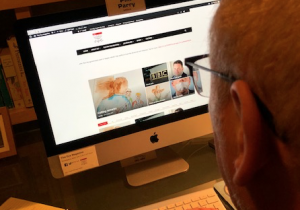
DPAC re-published the DWP notice confirming this rearrangement which stated: “Individual emails confirming accessibility requirements, reasonable adjustments, carers/ companions, and dietary requirements will be sent separately, but if there are any additional requirements you would like us to be aware of, please respond to this email to confirm”.
In one public letter from DPAC to Sir Stephen Timms, MP, they stated: “We are concerned you still do not understand the failures of your department. We have had no indication from you, or the DWP, whatsoever, in any statement, that you understand that the (planned, then cancelled and subsequently reinstated) consultation was organised in a way that was unsuitable for disabled people.
“You should thank the venue for saving your skin by cancelling at the last minute. The DWP’s arrangements were so poor that if the consultation had gone ahead as planned, it would have been blatant disability discrimination.
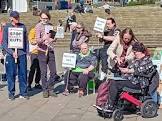
“The failures were staggering, and happened despite repeated warnings. We needed to know the venue so that we could plan our journeys, accommodation, and access requirements. We were ignored. We were promised a central location. Disabled people hoping to travel across Wales to take part were given merely three working day’s notice of a remote and inaccessible venue.”
The hurriedly re-scheduled ‘consultation’ meeting in Wales, and the passing of the welfare ‘reform’ bill last night following frantic ministerial moves, are set against a disturbing backdrop, where there are growing protests against benefit cuts, and the UK Government has been forced to embark on U-turns, as with winter fuel payments.
The Guardian reported about this change of heart: “The reversal comes despite Downing Street ruling out making changes to winter fuel payments after the Guardian revealed that it was rethinking the cut amid anxiety at the top of government that the policy could wreak serious electoral damage”.

Even before Wales’ solitary consultation was cancelled (and then reinstated), there had been enormous controversy about it.
Earlier DPACheld a demonstration in Swansea, with a simultaneous protest in Cardiff stating: “ We have almost zero faith in a consultation process that starts, on day one, by outlining all the areas it will not be consulting on. The most controversial proposals are not even up for discussion. There is one, and only one, in-person consultation event for the whole of Wales. Our MPs are ignoring our letters”.
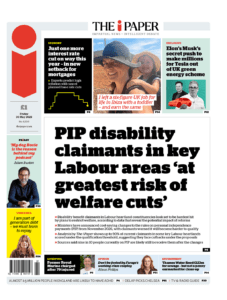
The Financial Times (FT) reported that one of the alterations is in the proposed assessment rules for Personal Independence Payments (PIP), so that individuals who receive a high overall score continue to be eligible, even if they do not receive at least four points in any category.
Another tweak will mean more time is given to claimants who lose access to one disability benefit to apply for other support they may be eligible for, and benefit claimants could be given longer “transitional periods” to ease the impact of losing support.
Sir Keir Starmer remains under huge pressure over his welfare cuts because they were blamed for Labour’s poor local election results in England, so ministers looked at potential changes to the disability benefit cuts as a way of staving off the backbench rebellion against them.
Like the disability cuts, other benefits too are in the spotlight, with Wales at the heart of the drama.
Eluned Morgan First Minister of Wales (FMW), urged the UK Government to scrap the two-child benefit cap, saying it was “damaging for lots of families in Wales”.

Meanwhile the Chancellor Rachel Reeves’ local Labour party was to call for her to abandon the controversial proposals.
The Leeds West and Pudsey Constituency Labour Party (CLP), which campaigned to return Ms Reeves to the UK Parliament last year as its MP, had agreed to write to her “as soon as possible” to make clear it does not support the cuts.
Opposition on Ms Reeves’s home patch, echo those in South Wales, and came as the UK Government grew increasingly anxious over appeasing its backbenchers concerning the scheme.
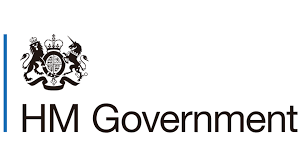
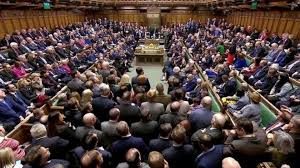
About 100 Labour MPs, more than a quarter of the party’s parliamentary numbers, are reported to have signed a letter urging ministers to scale back the benefit cuts.
Some MPs have expressed resentment at how the leadership is said to be handling opposition to the changes.
One newly elected MP said: “There hasn’t been any real attempt at engagement. It’s been left to backbenchers to hustle for a meeting. They almost see it as a virility test. It’s not helpful politics”.

Relations have been further strained after a highly critical letter published in The Guardian – in which 42 MPs told the Prime Minister that disability cuts would be “impossible to support” – did not get a response from Sir Keir’s office.
The MP added: “You’d think the leadership would say: ‘I’m a bit pissed you went to the papers but let’s talk about what you said.’ No one has made any overtures”.
There is understood to be unrest among newly elected MPs who feel they are being expected to defend policies they were not elected for while not being allowed any input.

One MP said: “Unless the government comes up with the idea, it doesn’t count. It’s a case of the new intake thinking: ‘I haven’t realised I’m irrelevant’”.
Another senior backbencher said: “I strongly think Number 10 see the PLP as a problem to be dealt with. The advisers around Keir think the PLP is an inconvenience…”.

This whole affair may have become more than merely an ‘inconvenience’ for the UK Government if they made huge changes so that the welfare ‘reform’ bill would pass.
But at least The Eye was thanked for highlighting the cuts involved!
- However it appears that disabled people are not thanking Ms Reeves for breaking down in tears, after she cut benefits.

Details of our Editor (who is himself disabled) Welshman Phil Parry’s astonishing decades-long journalistic career (when protests against Government policies were often covered), as he was gripped by the rare and incurable neurological condition Hereditary Spastic Paraplegia (HSP), have been released in an important book ‘A GOOD STORY’. Order it now.









